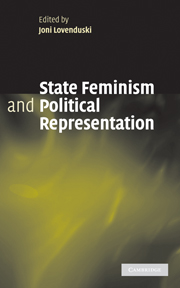Book contents
- Frontmatter
- Contents
- List of figures
- List of tables
- Notes on contributors
- Preface
- List of abbreviations
- 1 Introduction: state feminism and the political representation of women
- 2 Gendering political representation: debates and controversies in Austria
- 3 The Belgian paradox: inclusion and exclusion of gender issues
- 4 A politics for presence: state feminism, women's movements and political representation in Finland
- 5 Gendering the republican system: debates on women's political representation in France
- 6 WPAs and political representation in Germany
- 7 Gendering the debate on political representation in Italy: a difficult challenge
- 8 High tides in a low country: gendering political representation in the Netherlands
- 9 The women's movement, gender equality agencies and central-state debates on political representation in Spain
- 10 Party feminism, state feminism and women's representation in Sweden
- 11 Party government and women's representation debates: the UK
- 12 Women's policy agencies, the women's movement and representation in the USA
- 13 Conclusions: state feminism and political representation
- Appendix 1 Tables of women's representation in eleven countries
- Appendix 2 The RNGS model: summary of variable descriptors
- Index
- References
1 - Introduction: state feminism and the political representation of women
Published online by Cambridge University Press: 22 September 2009
- Frontmatter
- Contents
- List of figures
- List of tables
- Notes on contributors
- Preface
- List of abbreviations
- 1 Introduction: state feminism and the political representation of women
- 2 Gendering political representation: debates and controversies in Austria
- 3 The Belgian paradox: inclusion and exclusion of gender issues
- 4 A politics for presence: state feminism, women's movements and political representation in Finland
- 5 Gendering the republican system: debates on women's political representation in France
- 6 WPAs and political representation in Germany
- 7 Gendering the debate on political representation in Italy: a difficult challenge
- 8 High tides in a low country: gendering political representation in the Netherlands
- 9 The women's movement, gender equality agencies and central-state debates on political representation in Spain
- 10 Party feminism, state feminism and women's representation in Sweden
- 11 Party government and women's representation debates: the UK
- 12 Women's policy agencies, the women's movement and representation in the USA
- 13 Conclusions: state feminism and political representation
- Appendix 1 Tables of women's representation in eleven countries
- Appendix 2 The RNGS model: summary of variable descriptors
- Index
- References
Summary
The representation of women in a political system is a good test of its claims to democracy. The claims that women make for representation are claims for their citizenship and at the heart of their engagement with politics. Political representation is therefore a fundamental feminist concern, although its importance has not always been acknowledged. The women's liberation movements that began in the 1970s were, in many countries, ambivalent about formal political representation. However, by the end of the twentieth century women's movements were active to secure equality of representation throughout the world. From the moment that women's movements were making demands on the state the issue of their political representation was in play. Whilst suffrage campaigns were explicit movements for political participation and representation, campaigns over rights to education, to paid work, to equal pay, to personal dignity and security, to sexual autonomy were also in part about the inclusion of women's interests in policy-making. Later movements for representation in legislatures and assemblies were movements for presence that challenged political arrangements and sought to insert women's interests into policy-making by ensuring they were amongst the policy-makers.
The connection between agenda status for women's interests and the claim for equal political representation continues. Since the nineteenth century women's movement activists have demanded state action on a range of issues that includes anti-discrimination policies, anti-violence policies, reproductive rights, childcare and political equality.
- Type
- Chapter
- Information
- State Feminism and Political Representation , pp. 1 - 19Publisher: Cambridge University PressPrint publication year: 2005
References
- 8
- Cited by



